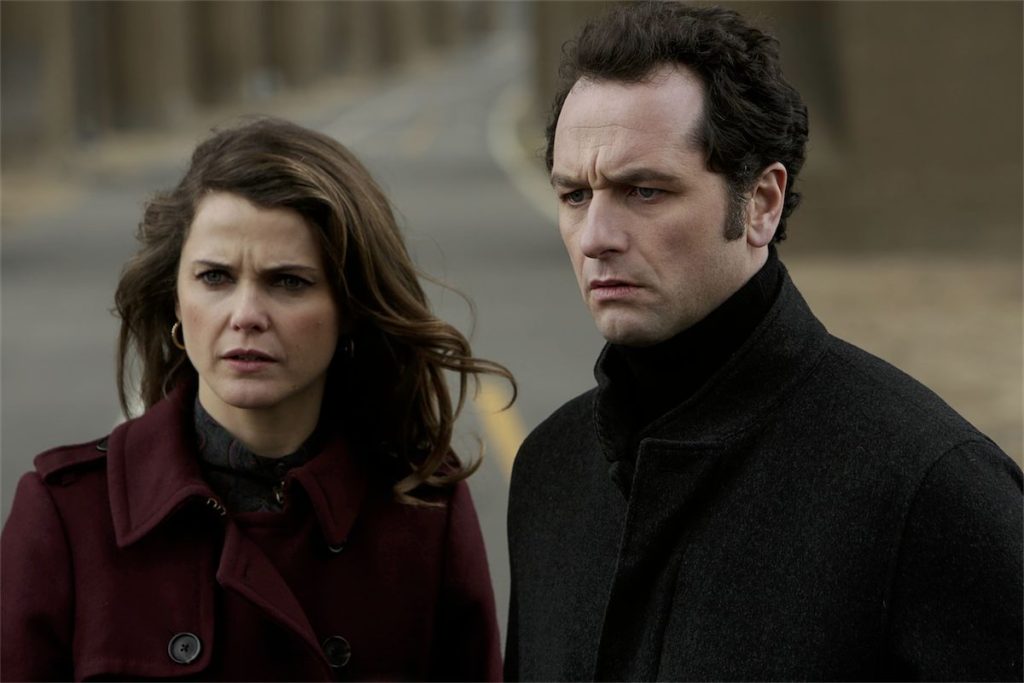(This article was originally published on Yourtango.com)
Last week, I said goodbye to Phillip and Elizabeth Jennings as “The Americans” wrapped up its amazing six-year run on FX.
I’m really going to miss the plot twists, disguises, awesome 80’s wardrobe, retro answering machines, and tape recorders.
But more than that, I am going to miss the richness of the rich relationship narratives. I was first drawn to The Americans for the spy drama, but what kept me coming back was the marriage between Elizabeth and Phillip.
In many ways, Elizabeth and Phillip are quite different than the typical American couple today. They’re Russian. They’re KGB spies. They didn’t meet and fall in love; they were matched to be co-workers with a cover of marriage.
And, yet, their relationship brings up so many intricacies of marriage that are relatable and pertinent to so many couples.
Here are 5 truths about marriage that we can learn from “The Americans”:
1. People change.
Elizabeth and Phillip were matched based on their mutual goals and shared vision — their sexual chemistry comes later. They are both committed to their KBG cause and work together for years.
But, at a certain point, the work catches up with Phillip and it becomes more and more difficult for him to partake in manipulating, seducing, and murdering. His conscience becomes more vocal for him and he just can’t do it anymore.
Elizabeth, on the other hand, doesn’t go through the same dissonance and internal conflict until much later on. Only in the final season does Elizabeth’s respect for the Center start to crumble, but until that point, there is considerable tension in their marriage due to being on different pages.
When two people commit to spend the rest of their lives together, the idea that they will each undergo changes as life evolves is something that can feel foreign and irrelevant — after all, when you’re in love it’s easy to hear common relationship obstacles and think, “Well, we’re not gonna be that couple.” But the truth is that change is inevitable. Perhaps one spouse decides to switch career paths, or no longer wants to live in the city, or changes their political affiliation. Or maybe one spouse goes through life circumstances that influence who they are and what they believe in.
These shifts are common and the question is not whether change will happen, but how you are able to stay connected as a couple connected despite it.
2. The kids know more than you think.
Elizabeth and Phillip try to shield their children from their relationship tensions and their identities as KGB spies. But, in as early as season one, we see Paige questioning Elizabeth being in the laundry room in the middle night, and the season finale showing Paige going down to do some surveying of her own. It’s clear that while Elizabeth and Phillip succeed for years in concealing themselves to the outside world, they underestimate how attuned their children are to their absences, sudden departures, urgent travel agent emergencies, and overall distraction over the years.
It’s not clear from the show whether any of the handlers had children of their own, but they often acted as the stand-in family therapist for Elizabeth and Phillip. What was so clearly missing was an understanding of how much children can sense things in their parents and how much they need authenticity and consistency. Elizabeth and Phillip themselves lived a life lacking that and there’s a sad symmetry in its transmission to their children. Paige’s choice to not go back to Russia can be seen as a rejection of her parents, but also as a decision to stay close to Henry, who she had to take care of for many years when her parents weren’t around.
3. Yes, men are emotional.
“The Americans” poignantly shows a complex man who is equally tough as he is sensitive. Phillip can be violent, manipulative, and angry. He also is heartfelt, loving, caring, and kind. We see his strong emotions throughout the series — his love for his children, Elizabeth, and even the women he worked with. We see his emotions really come up when he is tasked to getting close to Kimmy, who is just a teenager and young enough to be his own daughter. Or his concern over Martha’s welfare and getting her out safely. More intensely, we see Phillip’s ability to touch emotion when he attends EST and in the series finale when he says goodbye to Stan.
While there are certainly exceptions to the rule, pop culture often portrays men as having bulletproof egos, only caring about sex as a physical release, and walking around just thinking about “nothing” (thanks, Jerry Seinfeld). The truth is that men are emotional too; they have all the same emotions as women. Maybe some men don’t express themselves in the same way — machismo has a powerful hold — but behind the ‘tough guy’ there is often a reservoir of feelings, hopes, and fears.
4. The most important part of marriage isn’t communication.
Like many couples, Elizabeth and Phillip struggle with communication. And like many couples, that’s not their biggest problem. It’s mutual respect.
In the first episode, we see Phillip ready to defect and Elizabeth’s anger and shock at the prospect. As time goes on, their differences over Paige and whether she should join the cause keep them at odds. As Phillip pursues EST and finds meaning in it, we watch Elizabeth give it a shot, and though it resonates she comes back and shows her disdain. When Phillip eventually leaves the spy work and Elizabeth continues to go on solo missions, we see their struggle for mutual respect at its peak.
Their union was based on a shared mission, but it changes and they look at each other and they are faced with a difficult scenario. How do you respect your partner when they have become someone whose opinions and actions feel wrong to you? How do you reconcile that this person with whom you share a life, a home, a family, is someone you struggle to respect? What does it mean to find a place in your heart to love them anyway, to accept that this is where they are at today?
Good communication isn’t just about saying the right thing; it’s about the level of mutual respect that subtly lays underneath.
5. Vulnerability bonds us and binds us.
There’s a reason why we viewers were rooting for America’s enemy: We were invited into the vulnerable insides of Phillip and Elizabeth. As we watched them wrestle with vulnerability, both as individuals and as a couple, we saw how they struggled with uncontrollable forces of getting attached.
In their work, vulnerability is a weakness that they capitalize on in others, and their disguises are as figurative as they are literal. It is meaningful that both of them show their true selves to the agents they get closest to: Gregory for Elizabeth, and Martha for Phillip.
Both Phillip and Elizabeth endure loneliness, and they only have each other to lean on for support and empathy. But that means they have to be okay with vulnerability, feeling their feelings, and taking the risk of opening up to each other.
Today, vulnerability is an endangered species, and when it does happen it is usually buffered by a glass screen. It’s easy to hide behind the disguise of social media profiles, emojis, and catchy hashtags, and rely on time in between text messages to come up with something witty to answer. But love happens in real time, and it’s facilitated and deepened through risks of vulnerability. Through taking chances and opening up, even though we don’t know how exactly it will be received, it’s in those moments where we can truly connect with another person.
I’ll miss the way the characters on The Americans showed us the imperfect tapestry of relationships. How love and hate are not black-and-white; that it’s harder to be in the grayness because it means our heart is pulled in different directions. This is epitomized in the final confrontation with Stan in the garage: That our emotions run deep, often beyond our control, and that sometimes the scariest part of relationships is not in learning the truth, but realizing just how attached we’ve become.
This article was originally published on Yourtango.com


